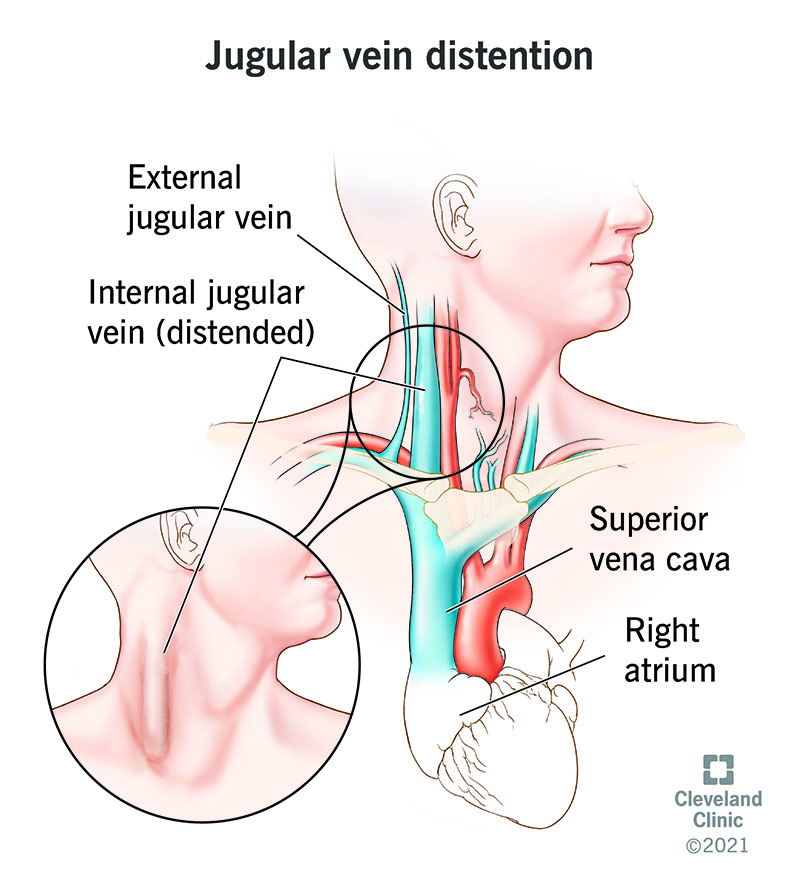Jugular vein distention is the bulging of the major veins in your neck. It's a key symptom of heart failure and other heart and circulatory problems. It’s not a painful symptom, but it can happen with conditions that can be life-threatening. Because of that, it’s important to have this checked by a healthcare provider if you think you have it.
Advertisement
Cleveland Clinic is a non-profit academic medical center. Advertising on our site helps support our mission. We do not endorse non-Cleveland Clinic products or services. Policy

Image content: This image is available to view online.
View image online (https://my.clevelandclinic.org/-/scassets/images/org/health/articles/23149-jugular-vein-distention-2.jpg)
Jugular vein distention is a physical exam finding where a large vein in your neck bulges visibly. When it happens continuously, it’s often a sign of serious — or even life-threatening — heart and circulatory problems.
Advertisement
Cleveland Clinic is a non-profit academic medical center. Advertising on our site helps support our mission. We do not endorse non-Cleveland Clinic products or services. Policy
The jugular veins are a major part of your body's circulatory system. They run from your head, down through your neck and into your upper chest.
There are two main pairs of jugular veins, the interior and exterior jugular veins, and jugular vein distention can happen in either.
Once they reach your upper chest, they join up with several other major veins to form the superior vena cava. The superior vena cava is the largest vein in your body, and it delivers blood directly into the right atrium at the top of your heart.
Jugular vein distention happens when there’s any kind of backup of blood in the superior vena cava or in your heart itself. Much like heavy traffic on a freeway can lead to backups and traffic jams, slowed blood flow in the heart or superior vena cava can cause blood to back up into the jugular veins. That makes the pressure in the jugular vein higher than it should be, which causes the vein to bulge outward.
Advertisement
Bulging of the jugular veins means that pressure is unusually high in the right atrium, the right upper chamber of your heart, and in the superior vena cava. That high pressure happens with several health conditions.
If you have jugular vein distention and low blood pressure, this is a sign of life-threatening conditions like:
Some of the other possible causes of jugular vein distension include the following:
There are ways to cause jugular vein distention for brief periods, even if you don’t have a condition that causes it, by raising the pressure inside the vein. A common way this happens is if you use a positive-pressure device like a continuous positive airway pressure (CPAP) machine to help you breathe while you sleep. That’s because these devices push air into your lungs, raising pressure inside your chest. That can cause jugular vein distention.
You can also cause this using the Valsalva maneuver or by lying on a tilt table with your feet raised above your head (the Trendelenburg position). A healthcare provider doing a physical exam may also press on your liver as part of an abdominojugular test. This test helps with diagnosing several of the conditions that cause this symptom.
Jugular vein distention isn't dangerous, but severe or life-threatening conditions can cause it. Because of that, treatment focuses on what’s causing it. Treating the underlying cause will help lessen this symptom or make it stop entirely.
Depending on the underlying cause, the treatments can range from no treatment to medication only or even to surgery. Your healthcare provider is the best person to tell you the potential treatments, including the ones that are most likely to help, and what you can expect with those treatments.
Jugular vein distention isn’t a finding you should try to diagnose at home by yourself. It takes a trained healthcare provider to identify it and determine what's causing it. You also shouldn't try to diagnose it yourself because it's sometimes a symptom of a life-threatening condition.
The best and safest choice is to see a healthcare provider who can determine if your condition is dangerous. They can also tell you if you can manage the condition from home and — if you can — how to do that.
Because jugular vein distention is a cause of other conditions, it’s not something you can directly prevent. Nearly all of the conditions that cause it also happen unpredictably, so preventing them is usually impossible.
Advertisement
If you think you have jugular vein distention, you should call your healthcare provider or schedule an appointment. That’s because this symptom happens most often in connection with serious heart and circulatory problems.
You should go to the hospital if you think you have jugular vein distention and have symptoms of low blood pressure like dizziness or passing out. That combination of symptoms happens with the following life-threatening conditions:
Jugular vein distention is a key finding of heart failure and several other heart and circulatory conditions. While it isn’t painful or dangerous on its own, it does happen with some severe and life-threatening conditions. If you suspect you have this condition, you should talk to a healthcare provider about your concerns. They can tell you if you have a condition that might present a problem and your options if you have such a condition.
Advertisement

Sign up for our Health Essentials emails for expert guidance on nutrition, fitness, sleep, skin care and more.
Learn more about the Health Library and our editorial process.
Cleveland Clinic’s health articles are based on evidence-backed information and review by medical professionals to ensure accuracy, reliability and up-to-date clinical standards.
Cleveland Clinic’s health articles are based on evidence-backed information and review by medical professionals to ensure accuracy, reliability and up-to-date clinical standards.
Cleveland Clinic’s primary care providers offer lifelong medical care. From sinus infections and high blood pressure to preventive screening, we’re here for you.
